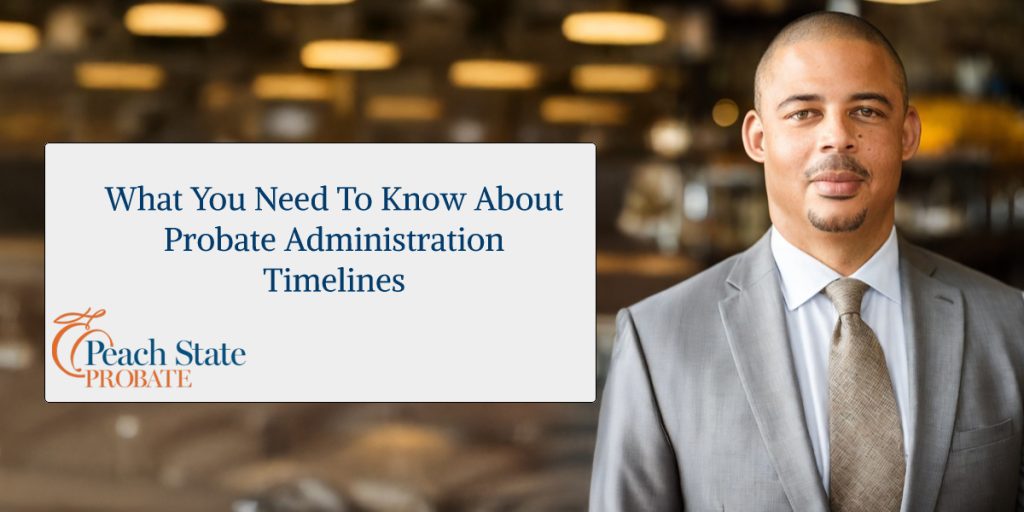## Understanding the Timelines in Probate Administration
Navigating probate administration can often feel overwhelming, especially considering the intricacies and nuances involved in the process. A timeline for probate administration should be more than just arbitrary dates; it should serve as a clear roadmap for the executor and beneficiaries, ensuring that all actions comply with state law while also honoring the deceased’s wishes. In Georgia, where Peach State Probate operates, the probate administration process follows specific steps that can greatly affect the timeframe from beginning to end. Familiarizing yourself with these timelines is crucial to understanding what to expect, and being prepared can ease a lot of the stress involved.
The probate administration timeline typically begins with the filing of the will, if one exists, followed by the appointment of an executor or administrator. This initial step can take anywhere from a few days to a few weeks, depending on whether the will is contested or if there are any complications. The executor is responsible for managing the deceased’s estate, including settling debts and distributing assets. Depending on the circumstances, this stage can extend for several months, especially if the estate is large or has numerous assets that need to be tracked down and valued.
Getting a grasp on probate administration timelines not only informs beneficiaries about the expected duration of the overall process but also highlights the specific steps involved. By understanding the milestones in probate administration, families can better plan their finances, prepare for distributions, and comprehend what kind of legal and financial issues may arise. Timelines act as a guiding framework through which family members can navigate their loss while also fulfilling legal obligations towards the estate.
## The Essentials of Probate Administration
Probate administration refers to the legal process that occurs after an individual’s death to manage and settle their estate. This may include validating the decedent’s will, resolving debts, and distributing assets to heirs and beneficiaries. When someone passes away, their assets and liabilities need to be identified, categorized, and addressed legally. This is often a cumbersome process, especially when the estate includes various types of assets such as real estate, personal property, and financial accounts.
A significant aspect of probate administration is the role of the executor. The executor, designated in the will or appointed by the court, is responsible for overseeing the probate process. This individual must ensure that all legal requirements are met, from the initial filing of the will to the eventual distribution of assets. In the absence of a will, the court will appoint an administrator to take on similar responsibilities, which may lead to further delays or disputes among potential heirs.
The steps involved in probate administration can vary, but they generally include filing the will with the probate court, notifying heirs and creditors, accounting for all estate assets, paying any debts and taxes owed, and finally disbursing the remaining assets to the rightful beneficiaries. Understanding these essentials can provide clarity and reduce misunderstandings during what is already a challenging time for families dealing with loss.
## The Importance of Understanding Probate Administration Timelines
Probate administration timelines hold significant relevance for various stakeholders, including executors, beneficiaries, and creditors. Knowing the expected sequence of events allows all parties to make informed financial and legal decisions, prepare documentation in a timely manner, and ensure adherence to legal deadlines. This is particularly critical in Georgia, where state laws dictate specific timelines for different aspects of the probate process, adding a layer of complexity to the proceedings.
Understanding these timelines is essential for managing expectations. Executors are tasked with making critical decisions that can influence the estate’s financial health, but they must also navigate the probate court’s requirements. For beneficiaries, knowing when they can expect to receive their inheritances is vital for planning their financial futures. This dimension underscores how essential it is for all interested parties to have clear insights into the process from start to finish.
Furthermore, poorly managed timelines in probate administration can lead to complications or even disputes among heirs and other related parties. For instance, delays in notifying creditors can result in increased debts for the estate, while any miscommunication surrounding asset distributions can lead to tension among family members. In short, understanding the timelines associated with probate administration is crucial for maintaining harmony and efficiency throughout the estate settlement process.
## The Legal Framework of Probate Administration Timelines
The legal framework governing probate administration timelines is rooted in both statutory requirements and judicial discretion. In Georgia, the probate process is primarily regulated by the Georgia Probate Code, which outlines specific timelines for various actions, such as filing the will, notifying heirs, and settling estate debts. Comprehending these regulations helps executors fulfill their fiduciary duties adequately while ensuring that beneficiaries receive their rightful inheritances in a timely manner.
When a will is filed for probate, the court typically requires that creditors be notified within three months of the appointment of an executor. This period allows creditors to present claims for any debts owed by the decedent. Failing to do this on time can lead to complications, including the estate being required to pay claims after distributions have been made to beneficiaries, thereby complicating the financial distribution and perhaps leading to familial disputes.
Additionally, there are timelines associated with the estate administration process itself, such as deadlines for final accountings and asset distributions. Executors must be diligent in following these timelines to avoid legal repercussions, including being held personally liable for failing to adequately manage the estate. Therefore, understanding the legal framework and the associated timelines is essential for anyone involved in probate administration, ensuring compliance and safeguarding one’s interests.
## Real-Life Scenarios Involving Probate Administration
Real-world examples of probate administration serve to illuminate how timelines can vary significantly based on the specific circumstances surrounding an estate. For instance, consider a scenario where an individual passes away leaving behind a comprehensive estate plan, including a clearly articulated will. In this case, the probate administration might proceed swiftly within a few months, as all necessary documents are in order and there are no disputes among heirs.
Conversely, suppose an individual passes away without a will, leading to an intestate situation. In such cases, the court must appoint an administrator and manage a different type of probate process, which can significantly extend the timeline. Heirs may also contest the appointment or the division of assets, further complicating matters. This could lead to protracted court battles that last not only months but sometimes years.
Another scenario might involve estates with significant debts or properties spread across multiple states. Here, the timeline for probate administration can be greatly impacted by the need to handle multijurisdictional laws, deal with creditor claims, and finalize valuations of various properties. Such complexities necessitate careful management and acute awareness of timelines, as delays can adversely affect both the administrative process and the beneficiaries’ experience.
## Essential Steps in Probate Administration
There are several critical steps that executors must undertake in the probate administration process that can directly influence the timelines involved. The initial step usually involves filing the will, if one exists, along with the necessary probate petition in the court where the deceased lived. Following this, the court schedules a hearing to validate the will, which is a key moment in the timeline that marks the shift into the active phase of probate administration.
Once the court validates the will, the next step involves the appointment of the executor or administrator, granting them the authority to manage the estate. This includes notifying beneficiaries and creditors, which must be done within the statutory timeframes set forth in Georgia law. Executors should also take inventory of all estate assets, which may require professional appraisals or valuations, depending on the complexity and size of the estate. Each of these phases can take significant time, particularly if complications arise or if there are disputes among heirs.
The final steps in probate administration revolve around settling debts, filing final tax returns, and ultimately distributing the remaining assets. The timelines for these concluding phases can extend based on how quickly creditors can be paid off and taxes settled. Executors must remain organized and proactive throughout this process to ensure the estate is managed efficiently and within the required legal frameworks, setting the stage for smooth distributions to beneficiaries.
## Common Pitfalls in Probate Administration
Navigating the probate administration process can be fraught with challenges and potential pitfalls that can derail timelines and complicate matters for everyone involved. One of the most common mistakes is failing to understand the legal requirements at each stage, including deadlines for notifications and filings. This oversight can lead to unnecessary delays and even legal ramifications, such as fines or complications related to the executor’s liability.
Another prevalent pitfall is inadequate communication with beneficiaries. Executors may overlook the importance of keeping heirs informed about the status of the estate and timelines for distributions. This lack of communication can breed frustration and distrust, leading to familial disputes that could prolong the probate process. It’s vital for executors to maintain open lines of communication to ensure that all parties understand their roles and the expected outcomes.
Lastly, procrastination is a significant hurdle in probate administration. Executors sometimes delay important tasks due to the emotional toll of the situation or unfamiliarity with legal obligations, which can have cascading effects on the entire timeline. Timely management of tasks is essential to keeping the probate process moving forward. Therefore, it’s crucial for all parties involved to remain proactive and meticulous in their approach to ensure a smoother probate administration journey.
## The Value of Legal Counsel in Probate Administration
Consulting an attorney specialized in probate administration is often a prudent step for executors and beneficiaries to take. The legal landscape can be complex and challenging, and having professional assistance can prove invaluable in facilitating smooth proceedings. An attorney well-versed in Georgia probate law can help navigate the myriad of legal requirements, ensuring that timelines are adhered to and that all actions comply with the law.
From the initial will validation to final asset distributions, an attorney can provide guidance at every critical stage of probate administration. They can assist with preparing necessary documents, representing the estate in court, and mediating disputes that may arise among beneficiaries. This is not only efficient but can also minimize the risk of costly mistakes that may further delay the process or create liability concerns for the executor.
Moreover, legal representation can offer peace of mind. Executors often face emotional stress during this challenging time, and knowing that a knowledgeable professional is managing the legal complexities allows them to focus on their personal grief and family dynamics. The value of legal counsel is, therefore, both practical and emotional, making the probate administration experience more manageable and less daunting.
## How Peach State Probate Can Facilitate Your Probate Administration
In Georgia, Peach State Probate stands out as a trusted resource for individuals navigating probate administration. Our commitment to providing personal, compassionate, and knowledgeable service sets us apart. We understand the emotional toll that the probate process can take, and we aim to alleviate some of that burden by offering expert guidance throughout every step of the journey.
Our comprehensive services encompass every aspect of probate administration, ensuring that clients are well-informed about their legal rights and responsibilities. From the initial filing of the will to the final distribution of assets, we provide accurate timelines and anticipate any complications that may arise. Our goal is to facilitate an efficient implantation of the probate process, minimizing delays while maintaining strong communication with all parties involved.
Beyond our knowledge of the legal framework, our empathetic approach sets Peach State Probate apart. We recognize that we are dealing with families during some of their most challenging times, and we aim to be a supportive presence throughout the process. With our help, clients can navigate probate administration with clarity and confidence, knowing that they are supported by a dedicated team focused on their best interests.
## Frequently Asked Questions About Probate Administration




